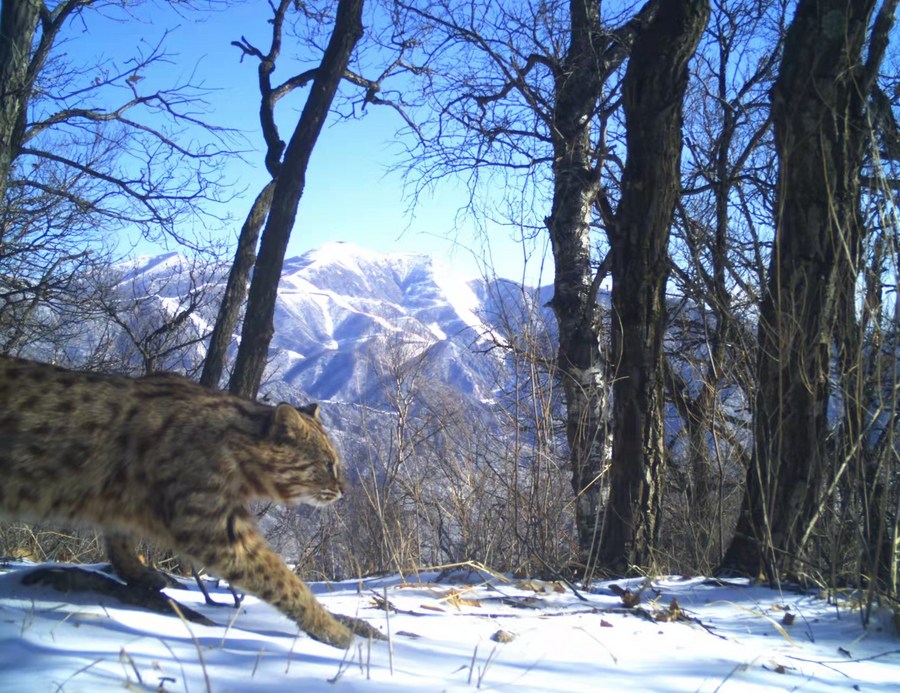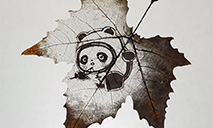The Winter Olympics' hidden spectators

An infrared camera captures an image of a leopard cat walking across fresh snow in Feb. 2021 on a mountainous trail in Yanqing District, Beijing. (Peking University/Chinese Felid Conversation Alliance/Handout via Xinhua)
BEIJING, Feb. 23 (Xinhua) -- The 2022 Beijing Winter Olympics was the most-watched Winter Games in history, but few would have expected the spectators to include wild animals. And yet, the coverage of the event featured several sightings of wildlife, particularly leopard cats apparently seeking to get in on the action.
On Jan. 31, on the alpine ski slopes in Yanqing district, around 90 km northwest of Beijing city proper, a leopard cat was spotted strolling through an award-ceremony rehearsal. The event caught the attention of volunteers and staff, with many snapping photos.
Three days later, a Chinese photographer captured another leopard cat in the woods near the Olympic ski slopes. The creature ran past him, jumped over a fence and looked back, apparently unafraid.
Among those most excited by these sightings was Luo Shujin, an avid skier and a conservation biologist at Peking University.
Leopard cats are wild felids, slightly larger than house cats, and they mostly steer clear of human activity. However, according to Luo, the frequent appearance of the animals close to the ski runs indicates that the species has persisted in this human-dominated landscape, which is relatively close to the megacity of Beijing. Meanwhile, their calm demeanor suggests they are not frightened by human activity.
Luo, 46, has been studying the wildlife around Yanqing for years. In December 2018, she was tracking leopard cat droppings on a mountain in Yanqing when she discovered that the animals were living close to the ski resort. She found this surprising and decided to gather photographic evidence of wildlife in the area.
"I thought about that famous pictures of a puma walking by the Hollywood sign in Los Angeles, and I asked myself: Can we get a picture of a leopard cat walking by the alpine ski course of the Beijing Winter Olympics?" She recalled.
To examine the state of the animal's population, she and her colleagues set up 10 infrared cameras along 15 km of the mountainous trail.
The efforts paid off. They got pictures of many wild animals, including roe deer, badgers, gorals and wild boar. Leopard cats were photographed three times, the first one caught on camera in February last year -- with the Olympic ski runs in the background.
"Who would have thought that this mountain trail, several kilometers away from the alpine skiing course of the Beijing Winter Olympics, would be frequented by leopard cats?" She said.
According to Luo, wild cats are rarely seen so close to big cities, especially metropolitan cities such as London, Paris and Washington D.C.
"I think this is a little-known side of Beijing," said Luo, who is proud of the fact that such wildlife can be found so close to nation's capital.
Luo sent the photo to the journal Science, along with a 300-word essay titled, "The Hidden Olympic Spectator," which was later published on July 23, 2021, the opening day of the Tokyo Olympic Games.
She also shared the discovery with the Beijing 2022 organising committee, explaining its significance in terms of biodiversity, helping them build a picture of the relationship between winter sports and nature.
Luo's relationship with the Winter Olympics has not all been field research. She has also found time to indulge her passion for winter sports. After several tests, she was appointed as technical officer on the Olympic alpine skiing referee team, bringing her even closer to the action.
For Luo, being surrounded by hundreds of athletes and spectators was a thrill -- a marked contrast to her solitary fieldwork.
"I was deeply touched by the exchange and communication at this grand event that spans races, languages and countries," she said. "Such an event causes me to hope that we can leverage our strengths to ensure continued coexistence between wilderness and human settlements."
Now that the Beijing Winter Olympics has ended, Luo plans to continue her leopard cat research in the area, just as her many European counterparts have carried out studies on wildlife around ski resorts near the Alps.
"The alpine skiing site on the outskirts of Beijing will be an excellent place to study how wild animals share the same space with humans," she said. "As we watch the skiers racing down the slopes, I know that the striding leopard cat will be watching us."
Photos
Related Stories
- Foreign enterprises ready to explore "blue ocean" in China's Olympic economy
- Forever You and Me: a song dedicated to Beijing 2022
- Burning stick glory of China Winter Olympic champions
- American women boost U.S. Olympic results despite poor Alpine showing
- Japan to send 73-member delegation to Beijing Winter Paralympics
Copyright © 2022 People's Daily Online. All Rights Reserved.










